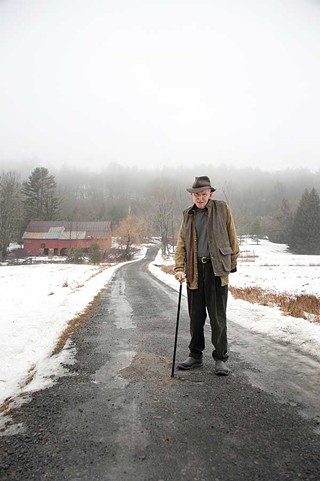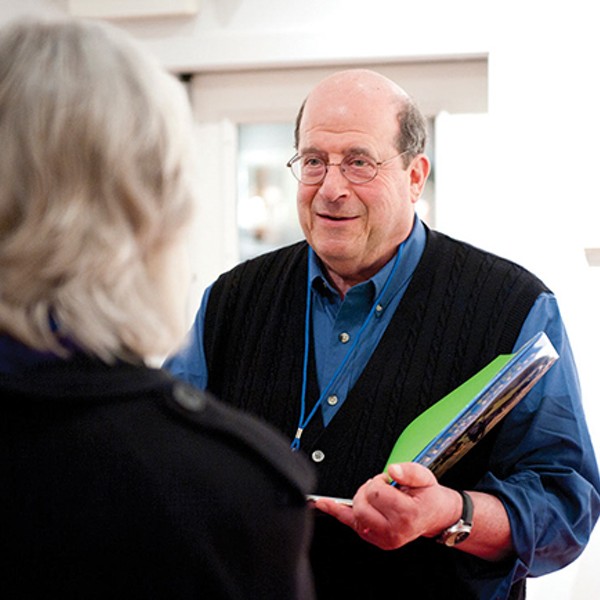358. To make a perfect sentence is a hard day's work.
Michael Perkins has put in a lot of hard workdays. His new book, Life Sentences: Aphorisms & Reflections (Bushwhack Books, 2012) includes 500 deft observations, as polished as stones in a creekbed.
The aphorist lives in a sage-green house at the foot of a mountain in Glenford outside the village of Woodstock. His driveway is lined with bare winter lilacs and filled with snow. Perkins doesn't drive.
484. We don't drive cars; they drive us.
For decades, neighbors have watched his gaunt figure traversing Ohayo Mountain Road's steep switchbacks on the three-and-a-half-mile walk to Woodstock. When Perkins and fellow poet/hiker Will Nixon published Walking Woodstock: Journeys Into the Heart of America's Most Famous Small Town (Bushwhack, 2009), an event flyer featured a photo of Giacometti's elongated Walking Man sculpture, captioned "Do You Know This Man? You've Seen Him on Woodstock Roads."
Walking Woodstock was Golden Notebook's bestselling paperback that year, abetted by Carol Zaloom's gorgeous cover and a "foot-stomping launch party" with local musicians. In his introduction, Perkins opined, "Taking a walk is a declaration of independence, like unhooking from the grid, or shooting your television, as that desert walker Edward Abbey once did. Walking is subversive."
308. Walk in the sun, walk in shadow; walk in all weathers, walk to work, walk to play, walk to get somewhere, walk to leave there. Walk until you fall down. Get up and stagger on.
Perkins brings the same dogged persistence to his literary peregrinations, having published some 40 books. "I've written in almost every genre," he says with some pride. Born in Portsmouth, Ohio, where he "grew up like Huck Finn" on the banks of the river his parents had crossed from Kentucky, he started sending out poems in his early teens; editor Irving Rosenthal encouraged his promise.
At 14, Perkins was diagnosed with nephritis and told had three years to live. "It turned out not to be true," he says. "But it gave me a kick in the pants. I grew up fast. Had to. I didn't want to miss anything."
78. When the odds are overwhelmingly against you, yield, but never surrender.
He married at 17, sped through college, and moved to New York at 20 with his artist wife and young daughter. "I hit the ground running," he says. He wrote for the Village Voice and New York Times Book Review, hanging out with such literary notables as Andrei Codrescu, Janine Pommy Vega, and Samuel R. Delany while renting a series of Lower East Side apartments. His one-act play "Death of the King of Harlem" premiered in Greenwich Village in 1966, and he soon became an editor at Tompkins Square Press.
Shortly after their second daughter was born, Perkins's wife took her own life. He was 25 and a widower, raising two daughters. "I got other people to help," he says, but the girls traveled with him. "They were dancing on tables in Madrid." When he was hired to write a screenplay for Cannon Films, they spent a year in Europe, traveling to London, Spain, Italy, Tangiers, Greece, Scandinavia, and Paris.
Next came two years in Brooklyn, where Perkins wrote the memoir Double Dealer. "My best book, and it's never been published," he says ruefully. He moved to Woodstock in 1972, joining a woman he'd met. "We lived in the slums of Woodstock," he deadpans. "We loved it. It was the country. After Brooklyn, a pure delight." Three years later, he bought the house in Glenford and joined the volunteer fire company.
431. Ethics simplified: what we owe to others is the best of ourselves.
Community work is essential to Perkins, who's also maintained trails for the Appalachian Mountain Club, organized the Woodstock Bicentennial, and spent 10 years as Program Director of the Byrdcliffe Guild (he's married to former Guild director Sondra Howell). But his most enduring contribution may be the Woodstock Library Forum, now in its 27th year. Three Saturdays a month, Perkins offers a lively mix of political speakers and literary events; he estimates that he's presented over a thousand writers.
83. Poetry should be pursued for its own sake, as a private spiritual practice.
Throughout, Perkins was writing, for love and for hire. "I've been a professional writer for almost 50 years," he reflects. "It filled me because I had the drive. A lot of people want to be writers; they don't want to write. If you don't love the process, it won't last."

















